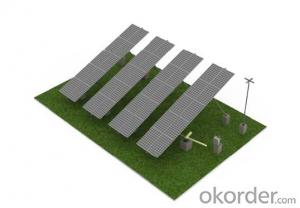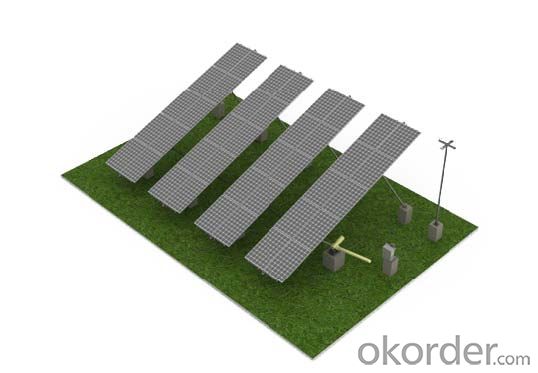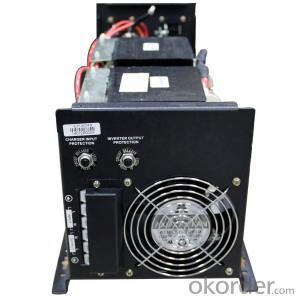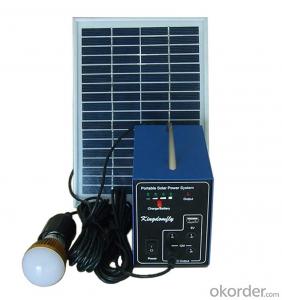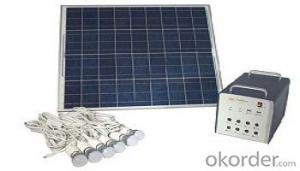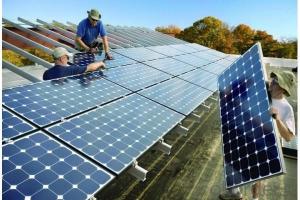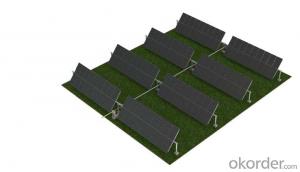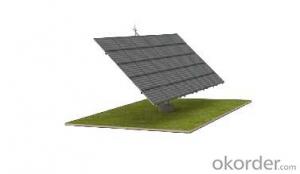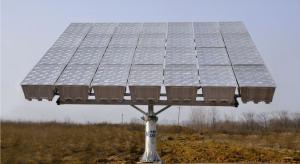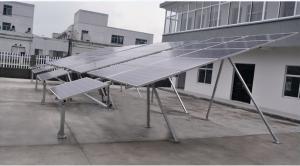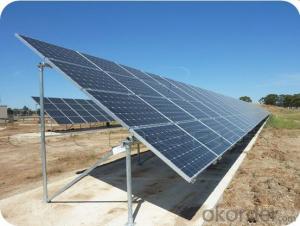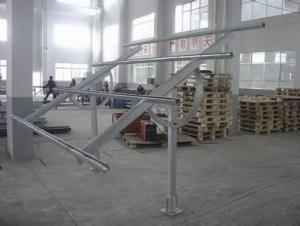Solar Energy Systems Llc Tilt Axis Tracking System Solar Mounting System
- Loading Port:
- China Main Port
- Payment Terms:
- TT OR LC
- Min Order Qty:
- -
- Supply Capability:
- -
OKorder Service Pledge
OKorder Financial Service
You Might Also Like
Packaging & Delivery
Packaging Detail:Normal package seaworthy
Delivery Detail:15 days
Specifications
Easy installation Competitive price TUV&SGS test report & CSA certification 15-warranty
Specifications
1) Super smooth beautiful appearance,outstanding quality,large supply.
2) Available in customized surface finishes.
3) Well machined,for example,cutting,drilling and milling with excellent tolerance.
4) Meet with customer’s designs and supply you best price.
5)Usages:Supply for solar panel modules.
Technical characteristics
Installation site:
ground,hillside,and grassland
Installation angle
it is based on customers’ requirements
Installation height
it is basedon customers’ requirements
Solar panel type; with or without frame
Components arrangement :horizontal or vertical
Support track
aluminum alloy extrusion
Quality warranty
15 years
Advantages
1)Quick installation: with high degree of pre-installed rate, the system could be easily installed by using galvanized carbon steel rails for PV Stent, and specially designed connection parts of the PV bracket, which could reduce installation time and cost greatly.
2)Offer unmatched durability: with all structural components comprised of high class stainless steel and anodized aluminum alloy, it is designed for 25 years service life and backed by 15 years warranty.
3)Stand up to extreme weather: The SuninTek solar mount is designed to stand up to the extreme weather complied with the AS/NZ 1170 and other international structure load standard by the skilled engineer. The main support components also have been tested to guarantee its structure and load-carrying capacity.
4)Provide broad installation flexibility: These systems accommodate most commercially available framed solar panels , and they can scale easily from small to large, multi-megawatt installations.
5)Diversified Application: The PV mounting system produced can be adopted by various types of PV cells panels which you can find in the market. It can serve for both mini solar power system and huge plant with megawatt capability.
Main features
1. Installation cost savings.
2. Save installation time.
3. Increase the mechanical strength of solar energy mounting to ensure that wind requirements.
4. The outdoor for installation of solar energy.
5. Length can be customized according to customers.
6. Service life of up to 25 years.
7. Products through the international certification.
8. Stent material composition of the galvanized steel and aluminum.
9. 15 years system and structural guarantee.
10.Flexible post spacing withstands different wind & snow loads.
11. High quality material in Aluminium 6005-T5 and SUS 304.
12.Screws and nuts go with every components needed.
13.Mechanical calculation and reliability tested to ensure highest product quality.
- Q: Can solar energy systems be used for heating and cooling?
- Yes, solar energy systems can be used for heating and cooling. Solar thermal systems can collect and store heat from the sun to provide hot water and space heating. Additionally, solar-powered air conditioning systems are also available, using solar energy to cool buildings.
- Q: Can a solar energy system be installed on a military base or facility?
- Solar energy systems are a viable option for military bases and facilities. Many military bases across the globe have already implemented solar energy systems as a dependable and sustainable power source. The installation of solar panels on military bases not only decreases their reliance on traditional energy sources but also strengthens their energy security and resilience. Integrating solar energy systems into existing infrastructure on military bases, such as rooftops, parking lots, or open fields, is a simple task. These systems can provide electricity for various purposes, including powering buildings, lighting, heating, cooling systems, and charging electric vehicles. Apart from reducing carbon emissions and combating climate change, solar energy systems also lead to long-term cost savings for military bases by reducing energy bills and improving energy efficiency. Furthermore, solar energy systems on military bases offer several strategic advantages. They promote energy independence by reducing dependence on vulnerable foreign energy sources and minimizing the risk of supply disruptions. By generating electricity locally, military bases become less susceptible to blackouts or power outages caused by natural disasters, cyber-attacks, or enemy actions. This increased energy resilience ensures that critical operations can continue even in challenging circumstances. Additionally, solar energy systems align with the military's commitment to environmental sustainability and reducing its carbon footprint. By being a role model and showcasing leadership in renewable energy implementation, military bases can inspire and influence other industries to adopt clean energy technologies, thus contributing to national and global efforts to combat climate change. To summarize, solar energy systems are highly compatible with military bases and facilities. They provide a reliable, sustainable, and cost-effective power source while enhancing energy security and resilience. By embracing solar energy, military bases can achieve their strategic goals, reduce their environmental impact, and inspire others to do the same.
- Q: How does the quality of solar panels vary based on the manufacturer?
- The quality of solar panels can vary significantly based on the manufacturer. Different manufacturers use different technologies, materials, and manufacturing processes, which directly impact the performance, reliability, and lifespan of the panels. Firstly, the efficiency of solar panels can vary based on the manufacturer. Efficiency refers to the ability of the panels to convert sunlight into electricity. Some manufacturers may use more advanced and efficient solar cell technologies, such as monocrystalline or thin-film, which can result in higher conversion rates compared to panels using polycrystalline cells. Secondly, the durability and reliability of solar panels are affected by the manufacturer. High-quality manufacturers conduct rigorous testing and use superior materials to ensure their panels can withstand harsh weather conditions, temperature variations, and impact from debris. They may also offer longer warranties, indicating their confidence in the product's durability. Thirdly, the lifespan of solar panels can vary based on the manufacturer's quality. Panels from reputable manufacturers are designed to have a longer operational life, typically ranging from 25 to 30 years. They may incorporate features such as anti-degradation technologies that prevent power output degradation over time. Furthermore, the manufacturing processes employed by different manufacturers can impact the overall quality of the panels. Manufacturers with strict quality control measures and standardized production practices tend to produce more reliable and consistent panels. They may also have certifications and comply with industry standards, ensuring their products meet or exceed set requirements. Lastly, customer service and support can also vary based on the manufacturer. Reputable manufacturers often provide excellent customer support, including after-sales services, technical assistance, and warranty coverage. This level of support can greatly impact the overall experience and satisfaction of solar panel owners. In conclusion, the quality of solar panels can differ significantly based on the manufacturer. It is important for consumers to research and choose panels from reputable manufacturers that offer higher efficiency, durability, lifespan, and customer support. Investing in high-quality solar panels ensures optimal performance and long-term savings in electricity costs.
- Q: Can solar energy systems be used in powering desalination plants?
- Yes, solar energy systems can be used to power desalination plants. Solar-powered desalination systems use solar panels to convert sunlight into electricity, which is then used to power the desalination process. This sustainable approach not only reduces reliance on fossil fuels but also helps address the water scarcity issue by producing freshwater from seawater in an environmentally friendly manner.
- Q: How much money can I save with solar energy?
- The amount of money you can save with solar energy depends on various factors such as the size of your solar system, your energy consumption, the cost of electricity in your area, and any available incentives or tax credits. On average, homeowners can save thousands of dollars over the lifetime of their solar panels, with some even achieving complete energy independence and eliminating their electricity bills.
- Q: Can solar energy systems be used for space heating?
- Yes, solar energy systems can be used for space heating. Solar thermal systems can capture and convert sunlight into heat energy, which can then be used to heat spaces in buildings. These systems typically involve solar collectors that absorb solar radiation and transfer the heat to a fluid or air, which is then circulated through the building to provide heating. Solar energy can be a cost-effective and sustainable solution for space heating, particularly in areas with abundant sunshine.
- Q: Can solar energy systems be used in areas with limited access to solar energy regulations and policies?
- Yes, solar energy systems can still be used in areas with limited access to solar energy regulations and policies. While regulations and policies can help promote and facilitate the adoption of solar energy, they are not necessarily a prerequisite for the installation and operation of solar panels. As long as there is sufficient sunlight available, solar energy systems can still be utilized effectively in areas without comprehensive regulations and policies in place. In such scenarios, individuals or organizations may need to navigate any existing regulatory frameworks or work towards implementing suitable policies to ensure the smooth functioning and integration of solar energy systems.
- Q: Can solar energy systems be used for powering electric vehicle charging stations?
- Yes, solar energy systems can be used to power electric vehicle charging stations. Solar panels can be installed to generate electricity from sunlight, which can then be used to charge electric vehicles. This not only provides a renewable and clean energy source for charging stations but also reduces reliance on the electrical grid and helps to mitigate greenhouse gas emissions.
- Q: Can solar energy systems be installed in urban areas with limited space?
- Solar energy systems can indeed be installed in urban areas with limited space. Despite the fact that urban areas often have limited rooftop space for solar panel installation, there are several creative solutions that can be used to overcome this challenge. One option is to install solar panels on vertical surfaces like walls or building facades. This approach makes the most of the available space and doesn't require additional land. By utilizing vertical space, solar energy systems can still generate a significant amount of electricity even in densely populated urban areas. Another solution is to implement community solar projects. These projects involve installing solar panels in a centralized location within the urban area, such as a parking lot or vacant lot. The electricity generated by these panels can then be shared among multiple buildings or households, allowing those with limited rooftop space to still benefit from solar energy. Furthermore, advancements in technology have resulted in the development of more efficient and compact solar panels. These panels can generate the same amount of electricity as traditional panels with less surface area, making them more suitable for installation in limited urban spaces. In addition to these solutions, it's important to consider the potential of integrating solar energy systems into existing infrastructure. For instance, solar panels can be installed on top of bus stops, streetlights, or even on the sides of bridges and highways. This allows for the utilization of spaces that would otherwise go unused. In conclusion, although limited space can be a challenge, there are various ways to install solar energy systems in urban areas. With innovative approaches and technological advancements, solar power can be harnessed even in densely populated cities, contributing to a more sustainable and renewable energy future.
- Q: Can solar energy systems be installed without professional help?
- No, it is highly recommended to have professional help when installing solar energy systems due to the complexity involved in designing and connecting the system to the electrical grid.
Send your message to us
Solar Energy Systems Llc Tilt Axis Tracking System Solar Mounting System
- Loading Port:
- China Main Port
- Payment Terms:
- TT OR LC
- Min Order Qty:
- -
- Supply Capability:
- -
OKorder Service Pledge
OKorder Financial Service
Similar products
Hot products
Hot Searches
Related keywords
